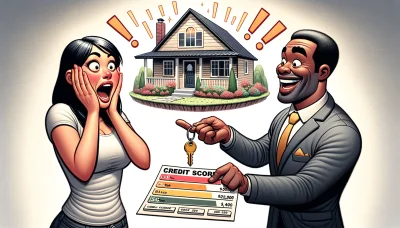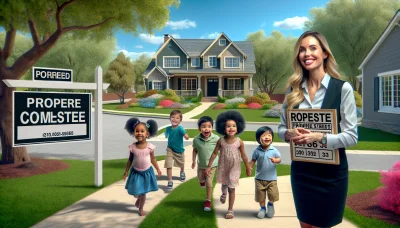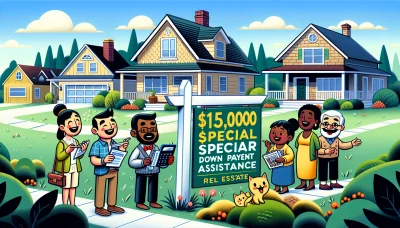Buying a second home as a primary residence Quiz
Test Your Knowledge
Question of
Understanding the Basics of Buying a Second Home
Defining Primary Residence vs. Second Home
A primary residence is where you live most of the year, while a second home can be a vacation spot or investment property. The distinction is crucial for legal and financial purposes. Your primary home is often your main address for tax, voting, and banking matters.
Second homes come with different considerations when it comes to insurance and maintenance. They aren't occupied year-round, which can affect the type of coverage you'll need. Furthermore, they may require additional security measures during the off-season.
Legal Implications
The law treats second homes differently in terms of residency requirements and benefits. For instance, some states have homestead laws that protect your primary home from creditors but do not extend this protection to secondary residences.
Owning a second home may also impact your legal stance on local matters. It's possible that you won't have the same rights as full-time residents in the community where your second home is located.
Tax Considerations
Taxes can be more complex with a second home. You might be able to deduct mortgage interest and property taxes, but there are limits and conditions that apply specifically to non-primary residences.
If you rent out your second home, there are additional tax implications to consider. Rental income must be reported, but certain expenses related to renting out your property can be deductible.
Mortgage Differences
Mortgages for second homes often have higher interest rates and down payment requirements than those for primary residences. Lenders view them as riskier investments due to their non-primary status.
Lenders also impose stricter approval criteria for second-home mortgages. They typically require proof that borrowers can handle both mortgage payments without relying on potential rental income from the second home.
Evaluating Reasons for Purchasing a Second Home
People buy second homes for various reasons, from investment opportunities to retirement planning. Understanding why you want a second home guides your search and affects financing decisions.
Your motivation might also influence the location and type of property you consider. Investment properties might be best in high-demand areas while personal retreats could be more remote.
Investment Opportunities
A second home can serve as an income-generating asset through short-term rentals or long-term leases. Real estate typically appreciates over time, providing potential capital gains upon resale.
- Research local real estate market trends before purchasing.
- Consider hiring a property manager if you're not nearby to handle day-to-day rental tasks.
- Understand local regulations regarding rental properties, such as city ordinances or homeowners association rules.
- Factor in periods of vacancy and ongoing maintenance costs when calculating potential returns on investment.
Lifestyle Enhancements
A vacation home offers a personal getaway to enjoy hobbies or unwind in a favorite locale. It allows you to establish deeper community ties outside of your primary residence area.
Owning a second home can also make traveling more convenient; no need to book hotels or carry heavy luggage back and forthyou've got all necessities at your retreat!
Retirement Planning
Purchasing a second home can be part of strategic retirement planning. Some people choose to buy in locations where they plan to retire, using vacations as test runs for future living situations.
This approach allows retirees to gradually transition into their new community and lifestyle while still maintaining the security of their primary residence until they're ready for the move.
Financial Planning for a Second Home Purchase
Assessing Your Financial Readiness
Analyzing your current financial health is crucial before considering a second home. Look at your savings, debt, and investment portfolios to ensure you have a solid foundation. Understand your credit score as it will significantly affect loan terms and interest rates.
Understanding the impact on your long-term financial goals is equally important. Purchasing a second property should align with your retirement plans, education funding, or wealth accumulation strategies. Make sure this investment doesn't derail other priorities.
Estimating the cost of ownership goes beyond the mortgage payments. Consider property taxes, insurance, maintenance, and potential rental income if you're not using it year-round. Create a detailed budget to anticipate these expenses accurately.
Securing Financing for a Second Home
Exploring mortgage options for a second home is different from your primary residence. Lenders often see these loans as higher risk, so be prepared for stricter requirements and possibly higher down payments.
Comparing interest rates and terms is essential for securing the best deal. Shop around with various lenders, including banks, credit unions, and online platforms. Look for competitive rates but also consider the flexibility of terms that match your financial situation.
- Check Your Credit: Ensure your credit report is error-free and work on improving your score months before applying.
- Debt-to-Income Ratio: Lower this ratio by paying off debts; lenders prefer a ratio under 36%.
- Documentation: Gather all necessary documents beforehand, such as tax returns, W-2s, investment statements, and proof of income.
- Saving for Down Payment: Aim to save more than the minimum required down payment to improve loan terms and reduce monthly payments.
- Interest Rates: Fixed-rate mortgages can offer stability in payments while adjustable-rate mortgages may provide initial savings but carry future risks.
- Lender Comparison: Don't settle on the first lender you find; compare offers to find the best rates and terms that suit your needs.
Preparing for the application process involves getting your financial documents in order. Lenders will scrutinize your debt-to-income ratio and evaluate your job stability among other factors. Be ready to explain any irregularities in your financial history.
Choosing the Right Location for Your Second Home
Researching Potential Areas
Embarking on the journey to acquire a second home starts with an exhilarating dive into potential areas. It's imperative to scrutinize the local culture, safety, and accessibility of each location. This foundational step sets the stage for a choice that aligns with your lifestyle and aspirations.
When identifying growth markets, look beyond the surface. Seek out areas with burgeoning economies, increasing job opportunities, and a trajectory of long-term sustainability. A flourishing market can signify a wise investment, promising an appreciation in property value over time.
The climate and geography of your prospective second home can dramatically affect your enjoyment and its practicality. Imagine waking up to the climate you love every day! Also, consider how geography impacts insurance costs and maintenancefactors like flood plains or earthquake zones are critical!
Evaluating local amenities and services is non-negotiable. Proximity to healthcare, education, entertainment, and dining options enriches your second home experience. These amenities not only ensure convenience but also contribute substantially to your quality of life.
Understanding Market Trends in Desired Locations
Analyzing real estate market data is like looking through a crystal ballit gives you insights into the pulse of the market. Scrutinize property values, historical trends, and inventory levels to gauge the health of the market. Knowledge here is powerthe power to make informed decisions!
Predicting future developments requires a blend of intuition and intelligence. Keep an eye on planned infrastructure projects or zoning changes that could influence property desirability. Being ahead of the curve can position you for lucrative gains or help you dodge potential losses.
Assessing risks and opportunities is about balancing optimism with realism. Understand that market volatility can affect property values. Consider external factors such as political stability, economic shifts, and demographic trends that might impact your investment.
- Market Research: Dive deep into housing trends, demand cycles, and economic forecasts for comprehensive insight.
- Location Scouting: Visit potential locations multiple times at different seasons to get a true feel for the area.
- Professional Guidance: Engage with local real estate experts who can offer nuanced perspectives specific to their market.
- Long-Term Planning: Think about how your needs may evolve over time, ensuring that your second home remains a fit for future you.
- Risk Assessment: Be aware of environmental risks or upcoming changes in local legislation that could affect your property's value.
- Budgeting: Factor in all costs including taxes, insurance, maintenance, and any homeowner association fees.
- Rental Potential: If considering renting out your second home when not in use, research rental market conditions in the area.
The Home Buying Process for a Second Property
Navigating Property Search and Viewings
Embarking on the search for a second property is an exhilarating adventure! Harness the power of the internet to kickstart your journey. Dive into online real estate portals, which are treasure troves of listings, photos, and virtual tours. This digital approach not only saves time but broadens your horizons, allowing you to explore far-flung gems from the comfort of your current abode.
Yet, nothing beats the human touch! Collaborating with a seasoned real estate agent can make all the difference. These market mavens offer insider insights and access to off-market properties that could be your perfect match. They'll be your guide, ally, and negotiator all rolled into one, transforming what could be an overwhelming process into a streamlined path to success.
Once you've pinpointed potential contenders, it's time to see them up close and personal. Scheduling visits and inspections is crucial it's like going on a series of first dates with homes that might become part of your life story. And don't forget the importance of a thorough inspection; it's the key to uncovering any hidden flaws before they become your financial burdens.
Making an Offer and Closing the Deal
When you're ready to take the plunge with a second property, understanding the offer process is paramount. This is where strategy meets paperwork. Crafting an enticing offer that speaks both to the seller's desires and safeguards your interests is an art form. It's not just about the numbers; it's about presenting yourself as the buyer they can't refuse.
Negotiating terms and price can feel like a high-stakes chess game, but oh, how thrilling it is! Here's where you flex your negotiation muscles, armed with market data and a clear vision of what you're willing to compromise on and what you're not. Remember, every term is negotiable: closing dates, contingencies, even which appliances stay or go.
- Pre-Approval Power: Secure mortgage pre-approval before making an offer it shows sellers you mean business!
- Contingency Clarity: Understand which contingencies to include for protection without scaring off the seller.
- Closing Costs: Factor in closing costs early so youre not caught off-guard by these additional expenses.
- Market Mastery: Know the local market inside out leverage this knowledge in your negotiations.
- Perspective: Keep emotions in check; remain focused on long-term investment goals rather than getting caught up in bidding wars.
The final act of this thrilling saga is finalizing the purchase. Its when patience pays off as you navigate through appraisals, title searches, and heaps of paperwork. But when you cross that finish line keys in hand its clear that every meticulous step was worth it. You're now not just a homeowner but a savvy investor who's expanded their kingdom!
Managing Your Second Home as a Primary Residence
Relocation Considerations
Moving into your second home as your primary residence comes with a plethora of considerations. You must evaluate the practicality of the move, considering distance from work, schools, and amenities. This is not just a change of address; it's a lifestyle shift that requires meticulous planning and adjustment.
Planning Your Move involves strategizing the logistics of relocating household items. It's crucial to decide what to take along, what to sell, or donate. Organize a moving timeline to ensure a seamless transition without last-minute chaos.
Changing Your Legal Residence Status is more than just forwarding your mail. You'll need to update your address with government agencies, revise tax information, and potentially alter your voting registration. This legal housekeeping solidifies your new primary residence status.
Adapting to a New Community means engaging with neighbors, finding local hotspots, and understanding community norms. It's about building relationships and establishing yourself within the social fabric of your new hometown.
Maintaining Multiple Properties
If you're keeping your former home, effective management is key. This involves regular property checks and maintenance scheduling to prevent deterioration. It's about being proactive rather than reactive with property care.
Handling Upkeep and Repairs can be challenging from afar. Hiring a trustworthy property manager or establishing relationships with local contractors can be invaluable. Ensure regular inspections are conducted to catch any issues early on.
- Managing Utilities and Services: For seamless operation, set up automatic payments for utilities to avoid disruptions. Consider smart home technology for remote monitoring and control of systems like heating and cooling.
- Dealing with Security Concerns: Invest in robust security systems and neighborhood watch programs to safeguard your property. Regular visits by you or a property manager can also deter potential threats.
- Tips for Effective Property Management:
- Create a maintenance checklist for seasonal upkeep tasks.
- Establish a network of reliable local service providers.
- Leverage technology for remote management and surveillance.
- Stay informed about local events that may impact your property.
- Maintain good communication channels with neighbors or caretakers.
Tax Implications and Benefits of Owning a Second Home
Owning a second home can be an exciting venture, but it's crucial to understand the tax implications that come with it. It's not just about having a getaway spot; it's a strategic financial move that can offer both benefits and responsibilities. Lets dive into the essentials of property taxes, deductions, and the unique advantages your primary residence holds in the realm of taxation.
Whether its for vacation, rental income, or simply as an investment, the decision to purchase an additional property can significantly impact your tax situation. Knowledge is power here, and grasping these concepts will empower you to make savvy decisions that align with your financial goals.
Navigating Property Taxes and Deductions
Understanding Property Tax Rules
The rules surrounding property taxes on your second home can be complex. Similar to your primary residence, your second home is subject to property taxes based on its assessed value. It's vital to stay informed about local tax rates as they can vary greatly from one area to another. Being aware of these nuances ensures you're not caught off guard when tax bills arrive.
Keep in mind that some jurisdictions offer tax breaks for properties that are not rented out or classified as vacation homes. Check with local tax authorities to see if your second home qualifies for any special considerations.
Maximizing Deductible Expenses
Mortgage interest and property taxes on your second home may be deductible on your federal income taxes, which could lead to significant savings. To take full advantage of these deductions, itemize them meticulously when filing your tax return. Remember that limitations exist on the amount you can deduct, so consult with a tax professional for guidance tailored to your specific situation.
- Keep Detailed Records: Save all receipts and documentation related to improvements and maintenance of your second home.
- Know the Limits: Be aware of the cap on mortgage interest deductions for both properties combined.
- Rental Considerations: If you rent out the property, additional deductions may be available, but specific rules apply regarding personal use days.
- Consult Experts: Tax laws change frequently; always seek advice from a tax professional who is up-to-date with the latest regulations.
Filing Taxes with Multiple Properties
Filing taxes becomes more intricate with multiple properties in your portfolio. You must report income and expenses for each property separately. This includes tracking rental income if applicable, as well as allocating mortgage interest and property taxes correctly between personal and rental use if you're renting out your second home part-time.
Capitalizing on Tax Advantages of a Primary Residence
Homestead Exemptions and Benefits
Your primary residence often qualifies for homestead exemptions that reduce the taxable value of the home, translating into lower property taxes. These exemptions are exclusive to primary residences and cannot be applied to secondary homes or investment properties. Make sure you're leveraging this benefit by registering your primary residence accordingly.
Capital Gains Tax Exclusions
Selling your primary residence might qualify you for capital gains tax exclusions which can result in significant savings if certain conditions are met. For example, if you've lived in the home for at least two out of the five years preceding the sale, you might exclude up to $250,000 (or $500,000 for married couples filing jointly) of capital gains from taxable income.
Rental Income Reporting
If you decide to rent out part or all of your primary residence for less than 15 days per year, the income received may be tax-free! However, once you cross that threshold or if you're renting a secondary property, this income must be reported on Schedule E of your federal tax return. Always keep detailed records of rental periods and associated expenses.
Insurance and Protection for Your Second Home
Choosing the Right Insurance Coverage
Securing insurance for your second home is a pivotal step in protecting your investment. It's crucial to understand that policies differ greatly and selecting the right one can save you from future financial distress. Ensure you're comparing apples to apples when reviewing policy offerings.
Different locations come with unique risks, making it essential to assess the coverage needs for your second home's environment. Whether it's prone to flooding, wildfires, or other regional threats, tailor your insurance to cover these specific challenges.
It's vital to delve into the details of policy limitations and exclusions. Certain events may not be covered under standard policies, necessitating additional riders or specialized coverage. Don't overlook this step; it's where many homeowners find themselves vulnerable.
Comparing Policy Types and Providers
When comparing policies, look beyond the premiums. Examine deductibles, coverage limits, and customer service reputation. Remember, cheaper isn't always better if it compromises on protection.
Seek out reviews and testimonials about insurance providers. A provider with a track record of fair claims handling and prompt service is worth its weight in gold during times of need.
Assessing Coverage Needs for Different Locations
Your second home may be nestled in the mountains or perched by the sea, each with distinct insurance implications. Consult with local experts who understand regional perils and can advise on necessary coverage components.
Tailoring your insurance to your home's location is not just smartit's financially savvy. Avoid paying for unnecessary coverage while ensuring you're not exposed to location-specific risks.
Understanding Policy Limitations and Exclusions
Familiarize yourself with what is not covered in your policy. This knowledge empowers you to seek supplemental insurance solutions or take preventive measures against uncovered risks.
Policies often exclude certain "acts of God" or require separate policies for events like earthquakes or floods. Investigate these exclusions closely so you can take action to protect your property fully.
Mitigating Risks with Additional Protections
Installing Security Systems and Safety Features
In addition to adequate insurance, bolstering your second home with security systems can deter crime and may even reduce insurance premiums. Consider modern solutions that offer remote monitoring for added peace of mind.
Safety features like smoke detectors, carbon monoxide alarms, and fire extinguishers are non-negotiables. They protect both your property and guests from common household hazards.
Preparing for Natural Disasters and Emergencies
- Know the Area: Understand local disaster risks and have evacuation plans ready.
- Emergency Supplies: Keep a well-stocked emergency kit with essentials like water, food, flashlights, and first-aid supplies.
- Insurance Review: Regularly review your policy to ensure it covers disaster-related damages adequately.
- Secure Documents: Store important documents in a safe location that is easily accessible during an emergency situation.
Regular Maintenance and Inspections
Routine upkeep is critical in preventing minor issues from becoming costly disasters. Schedule regular inspections to catch potential problems early on.
Maintaining your second home also involves seasonal preparationwinterizing pipes, clearing gutters, and ensuring heating systems are functional before colder months hit can save you from unpleasant surprises.
Long-Term Considerations for Second Home Ownership
Planning for Future Use and Legacy
When contemplating second home ownership, envisioning its long-term use is crucial. Whether it's a cozy cottage or a beachfront villa, your second home could serve as a gathering place for generations. Careful planning ensures that the property meets evolving family needs, becoming a cherished legacy.
Considering Rental Potential and Vacation Use : A second home can be a source of income when not in personal use. Assessing its rental potential demands attention to location desirability and seasonal demand. Moreover, balancing personal vacation time with peak rental periods maximizes both enjoyment and financial return.
Preparing for Retirement Living Options : A second home might eventually become your primary haven during retirement. Ensuring accessibility, convenience, and low maintenance are key factors that will make the transition smoother when the time comes.
Estate Planning and Passing Down Property : Estate planning is indispensable in securing your property's future within your family. Discussing intentions with heirs avoids conflict, while legal instruments like trusts can ease the transfer of ownership when necessary.
Evaluating the Resale Potential of Your Second Home
Keeping Up with Market Trends : Understanding real estate dynamics is vital in maintaining your property's value. Stay informed about market conditions in your area to anticipate fluctuations and make informed decisions regarding your investment.
Investing in Value-Adding Home Improvements : Strategic enhancements can significantly boost your second home's worth. Prioritize upgrades that appeal to future buyers, such as modernizing kitchens and bathrooms or adding sustainable features.
- Maintenance: Regular upkeep prevents costly repairs and preserves the propertys appeal.
- Curb Appeal: First impressions count; invest in landscaping and exterior aesthetics.
- Energy Efficiency: Upgrades like insulation and smart systems attract eco-conscious buyers.
- Neutral Decor: Opt for timeless design choices that resonate with a wider audience.
- Documentation: Keep meticulous records of all improvements and maintenance activities.
Timing the Market for Optimal Resale Value : Selling at the right moment can make a significant difference in returns on your investment. Monitor economic indicators and consult with real estate professionals to identify advantageous selling windows.












